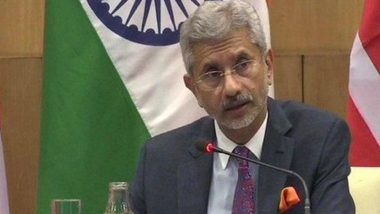New Delhi, January 28: External Affairs Minister S Jaishankar on Thursday outlined eight principles to repair strained relations between India and China that included strict adherence to all agreements on border management, fully respecting the LAC, showing sensitivity to each other's interests, and making peace and tranquillity along the frontier basis for advancing overall ties.
He also mentioned three "mutuals -- mutual respect, mutual sensitivity and mutual interests" as determining factors for the ties which, he said, came under "exceptional stress" following last year's events in eastern Ladakh as he referred to China's massing of troops in the region.
"Any expectation that they can be brushed aside, and that life can carry on undisturbed despite the situation at the border, that is simply not realistic," he said delivering the keynote address at the 13th All India Conference of China Studies. Union Budget 2021 Expectations: Defence Sector May Receive Higher Allocation For Modernisation of Armed Forces Amid Ongoing India-China Standoff.
He said the India-China relationship is truly at a crossroads today and choices that are made will have profound repercussions, not just for the two nations but for the entire world.
In criticism of China, Jaishankar said the developments in eastern Ladakh have "profoundly disturbed" the ties because they not only signalled a "disregard" for commitments about minimising troop levels, but also showed a willingness to breach peace and tranquillity.
"Significantly, to date, we have yet to receive a credible explanation for the change in China's stance or reasons for massing of troops in border areas. It is a different matter that our own forces have responded appropriately and held their own in very challenging circumstances," he said.
"The issue before us is what the Chinese posture signals, how it evolves, and what implications it may have for the future of our ties," Jaishankar added.
Giving a clear perspective of India's approach in dealing with China, the minister said the development of ties can only be based on "mutuality", whether it is immediate concerns or more distant prospects. Talking about experience of the past, he said it showed the importance of stabilising ties even while adjusting to changes.
"From that, we can seek proper guidance that will be to the benefit of both nations. These can be summed up by eight broad propositions. First and foremost, agreements already reached must be adhered to in their entirety, both in letter and spirit," he said.
"Second, where handling of border areas is concerned, the Line of Actual Control (LAC) must be strictly observed and respected; any attempt to unilaterally change the status quo is completely unacceptable," Jaishankar added.
Third, he said, peace and tranquillity in border areas is the basis for development of ties in other domains, noting if they are disturbed, so inevitably will be the rest of the relationship. This, he said, is quite apart from the issue of progress in boundary negotiations.
"Fourth, while both nations are committed to a multi-polar world, there should be a recognition that a multi-polar Asia is one of its essential constituents. Fifth, obviously each state will have its own interests, concerns and priorities; but sensitivity to them cannot be one-sided. At the end of the day, relationships between major states are reciprocal in nature," Jaishankar said.
"Sixth, as rising powers, each will have their own set of aspirations and their pursuit too cannot be ignored. Seventh, there will always be divergences and differences but their management is essential to our ties," he said. The last principle, he said is that civilisational states like India and China must always take the long view. India-China Military Commander-Level Meeting: Both Sides Carry Out Candid and In-Depth Exchange of Views on Disengagement of Troops Along LAC in Western Sector During 9th Round of Talks.
"Respecting the three mutuals and observing those eight principles that I spoke about will surely help us make the right decisions," he said. Referring to talks to resolve the standoff, he said discussions were underway through various mechanisms on disengagement at border areas.
He said the advancement of ties in the last three decades was clearly predicated on ensuring that peace and tranquillity was not disturbed and that the LAC was both observed and respected by both sides.
"For this reason, it was explicitly agreed that the two countries would refrain from massing troops on their common border," he said. Jaishankar also talked about "events" before 2020 that reflected the "duality" of cooperation and competition while referring to blocking at the UN the listing of Pakistani terrorists involved in attacks on India as well as Beijing's opposition to New Delhi's membership of the Nuclear Suppliers Group (NSG) and for a permanent seat in the UNSC.
"We saw trade grow dramatically, though its one-sided nature made it increasingly controversial. In sectors like power and telecom, Chinese companies obtained access to Indian market," he said. Jaishankar said though common membership of plurilateral groups by India and China was a meeting point, yet, when it came to interests and aspirations, some divergences were apparent.
"You may recall the practice of stapled-visas; or the reluctance to deal with some of our military commands. Then there was China's opposition to India's membership of the NSG and to a permanent seat in the UNSC.
"When it came to trade, promises of market access did not match delivery. The blocking of UN listing of Pakistani terrorists involved in attacks on India had its own resonance. And of course, the violation of Indian sovereignty by the China-Pakistan Economic Corridor," he said.













 Quickly
Quickly


